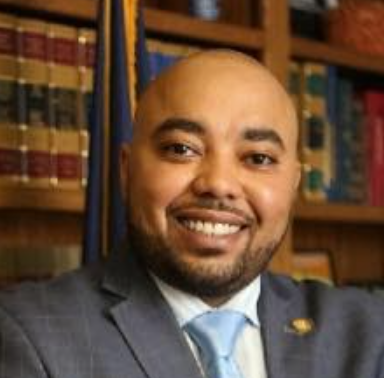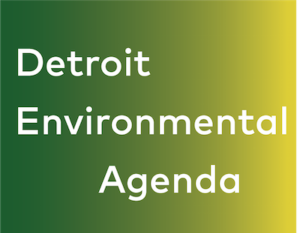Fred Durhal

Q: Where can people go to learn more about your biography? If not readily available online, please describe in 150 words or less, your relevant experience, public offices held (if any), involvement in environmental causes, and membership in any environmental organizations. If you currently hold office, describe any votes or actions demonstrating concern for the environment.
A: Hon. Fred Durhal III is a former member of the Michigan House of Representatives. He has served as the Assistant Democratic Leader of the House and the Minority VC of the House Appropriations Committee (Ranking Democrat). Additionally, Durhal served on the Appropriations Committee on the Department of Natural Resources. Durhal has always been an advocate for environmental justice, clean air and water, and has worked to improve the lives of those affected by the Flint Water Crisis. He has worked closely on legislation with the Sierra Club and Michigan League of Conservation Voters. https://www.durhalfordetroit.com/about-fred – https://en.wikipedia.org/wiki/Fred_Durhal_III
Community
Q: If elected, how will you work with Detroit residents to ensure that they benefit from and partake in the decision-making surrounding local development projects and that potential adverse impacts of those projects are identified, measured, monitored and mitigated? Moreover, how would you work to put more power into the hands of residents to maintain and revitalize their own communities and to access vacant land through the DLBA?
A: When elected, I will collaborate closely with residents to ensure the success of Community benefit Agreements that are already established and work to improve them to ensure a better community for citizens. As it relates to demolition and development projects within our community, I will support and sponsor ordinance that create transparency, encourage environmental studies before projects commence, and create an accountability standard for those who do not perform work in a responsible and safe manner for our residents. Additionally, as it relates to land bank owned properties, I will introduce three ordinances; The first ordinance established will provide a quarterly report from the Land Bank Authority on the maintenance of properties owned that will be disseminated to the public for transparency. The second ordinance would give preference to legacy Detroiters who have resided in the city for at least 10 years, particularly those who have lost their homes to foreclosure due to the $600 Million Dollar over- taxation and assessment of properties that were owned. Finally, I will work to create a Reimbursement Fund in which a percentage of revenue from purchased Detroit Land Bank owned properties is distributed to those affected by the over assessment and taxation.
Q: If elected, what budget appropriations would you propose to increase investment in needed social and environmental services to help improve the quality of life and health of Detroit residents?
A: When elected I will propose appropriations that build a Health and Wellness Recreational Center in District 7, that provides programs and services for residents. This center will allow access to City Health Department Services, health education and preventative care, and fitness creating better health outcomes for our residents. Additionally, the appropriation would develop programs that provide wrap around services for citizens who are low-income and affected by intergenerational poverty. As it relates to the appropriations to improve environmental services, I will propose and increase in funding to create quarterly reports and annual studies on the environmental impact of provided city services to our residents. These studies include but are not limited to the testing of water, air emissions, and soil from commercial properties and businesses that operate in the City of Detroit.
Public Health
Q: What long term solutions do you see for addressing vehicle speeds and making our streets safer?
A: There are three long term solutions that will address vehicle speeds in our City. The first solution is the increase of police presence and traffic control not only on main streets, however in our residential areas. To ensure the success of this solution means that we need to attract more officers to join the department, hire more officers, and retain the officers we have. This solution will require an increase in pay that is commensurate with other localities in our state and large municipalities around the country. The second solution would be to invest and deploy speed bumps in all our residential areas, particularly in areas where there is a high concentration of Seniors and Youth. Finally, the last solution would be to work closely and advocate with members of our State Legislature to increase the fines and penalties of residential speeding.
Q: How will you work to reduce the negative health impacts of air quality on the residents of Detroit?
A: As a member of the Detroit City Council I will support and sponsor ordinance that require safety specific zoning, better air emissions standards, and create studies on the negative impact that air quality has on our residents. Additionally, I will work closely with our industrial and manufacturing corporations to encourage better standards and practices to reduce the effect their products and material have on City residents. Finally, I will work within our city budget to provide home air filters and filtrations systems for those who live close to our industrial and manufacturing communities.
Q: If elected, what actions will you take to work toward safer, healthier, and more affordable housing for all Detroiters?
A: As a member of the Detroit City Council, I will advocate for more affordable housing units and development within the City of Detroit and work to create programs that assist renters in becoming homeowners from the use of federal and state funding. Partnering with our State Housing Development Authority, I will work to duplicate homeownership, neighborhood enhancement, and property improvement programs that have proved successful. Additionally, I will work establish ordinances that encourage developers to guarantee at least 35% of housing projects include space for low income families, even if the properties are not developed with LIHTC funds. Finally, I will work close with our energy provider to advocate and create education programs that focus on energy efficiency and best practices.
Energy
Q: What are your priorities to reduce emissions and lessen the impacts of climate change in Detroit during your term in office?
A: My priorities to reduce emissions and lessen the impacts of climate change are to continue the advocacy for better air emissions, ensure the enforcement of the Greenhouse Gas Ordinance and standards set for 2024, and work to increase the use of solar power and energy on all city owned structures. Additionally, I will work to ensure there is an established educational component available to residents about the effects of air emissions on climate change and how to create better habits as an individual to reduce its effects. Finally, I will work closely with our energy provider to establish better partnerships and more energy efficient ways to promote the health, financial stability, and environmental success of our communities.
Q: What are your plans for helping the city transition to renewable energy and how will you ensure that the cost benefits and increased resilience that come from the use of renewables is made accessible to low-income and vulnerable communities across Detroit?
A: My plans to assist with the City’s transition to renewable energy are to start with our government buildings and city-owned structures first. This means working to utilize more solar power, energy efficient lighting and heating sources, energy-efficient city owned vehicles, and best practices on how to conserve energy within city buildings with simple practices such as turning the lights off in unused offices and buildings. To ensure the use of renewables and its accessibility to low-income families, I will work to create grants programs for low-income families to purchase renewables, build partnerships with local corporations and nonprofits to establish philanthropic funding, and create tax credit and rebate programs for Detroiters to make the transition.
Recycling
Q: How can the city increase recycling, composting, and the use of post-consumer recycled materials, while addressing the city’s litter and illegal dumping problem?
A: The City of Detroit must provide a City-Wide campaign encouraging responsible recycling. This campaign must include an educational component on how to effectively recycle, what to recycle, and how the use of composting can be beneficial to the community, particularly in the growing trend of urban gardening. There could also be a tracking mechanism that is created for those who recycle, allowing a specific tax-credit for the amount of materials recycled responsibly in a calendar year. Finally, there should be a monetary reward program established for citizens who report illegal dumping upon the ticketing or conviction of the offender.
Jobs
Q: What steps would you take to prepare the local workforce to take advantage of and be part of the movement toward a green economy, through qualifying for good paying infrastructure and clean energy jobs, amongst others?
A: The steps that I would take to prepare the local workforce are advocacy, educational components, and the creation of a comprehensive environmental job task force which is solely focused on making the transition to the jobs of the future. The City of Detroit can be a leader as we rebuild our infrastructure to promote clean energy. To create the pipeline to achieve this goal, the creation of city jobs that pay high salaries to modernize our infrastructure would incentivize Detroiters to apply for these jobs. Additionally, the creations of training programs that prepare our residents for these jobs, can be partnered in conjunction with our local community college, unions, and business leaders.
Water
Q: How will you ensure that clean water is accessible and affordable to all Detroiters?
A: I will support the extensions of a moratorium for water shut-offs . Additionally, I will work to require water testing transparency for citizens. Finally, I will work to establish in our City budget and through the help of philanthropic partnerships a water amnesty program for low-income families who qualify and will never be able to resolve their overdue water bills.
Q: How will you help municipal agencies and property owners integrate Green Stormwater Infrastructure (GSI) across the city to manage stormwater and reduce drainage charge fees for property owners?
A: I will work with our City Water Department to overhaul antiquated water systems and create new infrastructure to curtail leakages that increase water rates. I will also work to create infrastructure that diverts and transfers storm water to a dedicated community reservoir that can be utilized for community gardens, lawn maintenance, and repurposed irrigation.
Optional
Q: Please identify the top environmental concerns to you personally, identify the environmental issue in your community that is the most pressing, and what you would like to do as an elected official to address this most pressing concern.
A: One of the top environmental concerns in District 7 is the illegal dumping that takes place within our residential communities. When elected, I will focus on eliminating this illegal dumping by establishing reward programs for citizens who identify culprits. Additionally, in areas that have been traditionally used for illegal dumping, I will work to create surveillance mechanisms to minimize repeated violations.

